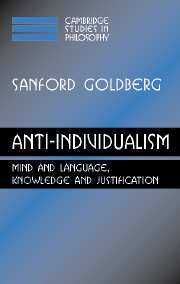Book contents
- Frontmatter
- Contents
- Preface
- Introduction
- Part I SEMANTIC ANTI-INDIVIDUALISM
- 1 The nature of knowledge communication
- 2 Public linguistic norms: the case from successful communication
- 3 Public linguistic norms: the case from misunderstanding
- 4 From public linguistic norms to anti-individualism regarding language and thought
- Part II EPISTEMIC ANTI-INDIVIDUALISM
- References
- Index
3 - Public linguistic norms: the case from misunderstanding
Published online by Cambridge University Press: 22 September 2009
- Frontmatter
- Contents
- Preface
- Introduction
- Part I SEMANTIC ANTI-INDIVIDUALISM
- 1 The nature of knowledge communication
- 2 Public linguistic norms: the case from successful communication
- 3 Public linguistic norms: the case from misunderstanding
- 4 From public linguistic norms to anti-individualism regarding language and thought
- Part II EPISTEMIC ANTI-INDIVIDUALISM
- References
- Index
Summary
INTRODUCTION
In the previous chapter I defended the hypothesis of public linguistic norms by appeal to the nature of successful communication. The phenomenon to be accounted for was that whereby two participants in a speech exchange efficiently transmit very specific knowledge to one another through their speech, even under conditions in which they know nothing of each others' speech and interpretative dispositions save what is manifest in the brief speech exchange itself. The burden of chapter 2 was to argue that the reliable comprehension that is attained in such cases seems miraculous unless we suppose that there are such norms – norms which (given the concrete speech context) determine what the speaker literally said with her words, and which are at least implicitly exploited by the hearer in the process by which she arrives at a representation of the content of the speech she observed. Whereas that argument for public linguistic norms is thus an argument from Successful Communication, the present argument, in contrast, will be from a certain kind of unsuccessful communication – that arising from cases in which, though the speaker aims to be communicating knowledge, this aim is thwarted owing to misunderstanding. My central thesis will be that in these sorts of misunderstanding cases at least one of the parties is appropriately blamed for the breakdown in communication, and that (at least in RC-cases) warranted ascriptions of blame presuppose public linguistic norms.
- Type
- Chapter
- Information
- Anti-IndividualismMind and Language, Knowledge and Justification, pp. 83 - 101Publisher: Cambridge University PressPrint publication year: 2007



